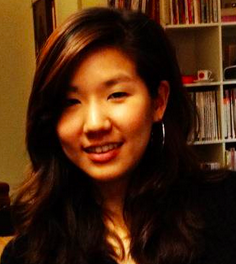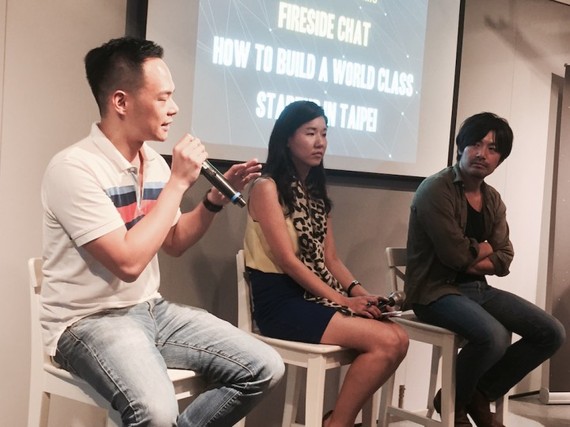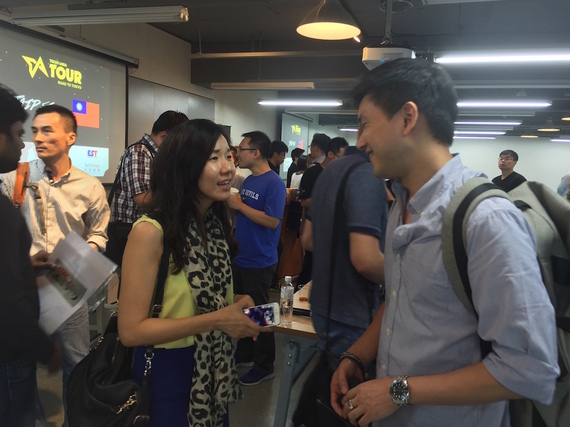Startup Insider is a series of articles with the goal of helping aspiring founders and entrepreneurs understand the ins and outs of starting a startup. We hope to dig deeper and showcase stories, advice and lessons from founders, investors and other key players in the growing startup ecosystem all over the world. You can sign up to stay up to date with this series here.
Back in the Echelon Conference, we interviewed 3 different women venture capitalists. So far, we've written about Ardent Capital's Tee Suraphongcai and 500 Startups' Edith Yeung.
Today, we're featuring Tina Cheng from Cherubic Ventures. Tina had worked in Silicon Valley tech giants Yahoo and CISCO before deciding to return to her home country Taiwan to become an entrepreneur.
She teamed up with a friend to start an education startup that she would run for 2 years. This gave her the opportunity to gain some real operational experience of growing a company from zero to something. However, the everyday grind of running a startup would bite Tina as she recalled struggling after 2 years of running the company because of the stagnant growth they had hit entering their 3rd year.
While the company is still up and running up to today, Tina decided to leave after 2 years for a change in scenery. She recalled, "I didn't have a mentor at that time who could've told me that this stagnant growth was normal and that sometimes you just have to plow through these phases."
Her experience both in the Valley and in Taiwan would help her build her network and prepare her for the venture capital (VC) world.
She shared, "I now have a big network and a lot of contacts both in the Silicon Valley ecosystem and Taiwan that really helped me get to where I am today which is at early stage investment, knowing entrepreneurs and being a good judge of character."
She highlighted how you have to be "able to decide if this person has the right qualities to run this startup or does this startup company have the necessary ingredients to be successful in the space they're in now."
Early Stage VC - More than a science
When we asked Tina what she looks for when investing, she talked about early stage investing being more of an art rather than a science.
She shared, "If you talk to a lot of early stage investors, they'll tell you the same thing. When you're an early stage startup, you don't really have revenue. A lot of them only have a prototype or an idea some times. In that scenario, you're only looking at the entrepreneurs and the team."
However, she also shared with us how what they look for in China and US also differ. She shared, "In the US, we want to look for teams that are really really strong in their domain expertise and they usually have really really strong product vision."
Tina added, "Where does this founder/team want to take this product to a future that no one can see right now? A lot of the products that you see today like Snapchat, Airbnb and Uber, when they first started out, people thought they were crazy right but the founder didn't just give up."
This is the product vision and belief in yourself that Tina looks for when investing. She highlighted how it's easier to trust a founder who has a strong product vision and has the technology in the Western world because there's a higher chance that they'll actually see things through even if the idea is crazy.
On the other hand, in China and Asia, the product innovation that happens is a bit different. Tina shared, "The startup ideas aren't necessarily groundbreaking or innovative or they may not have the strongest technology but the founders in Asia have to be really good at finding traction, finding users and taking market share."
She highlighted how successful founders in Asia are usually very charismatic, move really fast, understand how to find and get a large user base, and most importantly, how to outpace the competition.
Trends in Taiwan
Tina shared how in Taiwan you will see a really strong manufacturing industry and people who work really really hard. She mentioned how NEST and Fitbit actually have their products made in Taiwan.
At the same time, Tina is happy to see how the government is starting to push for the growth of a lot of businesses and startups in Taiwan. She mentioned how there is now more funding from the government and the government has created incentives for international investors to not only invest in Taiwan but to also bring in international know how, mentorship and partnership to the ecosystem.
While India and China are the main powerhouses in Asia right now, Tina mentioned how Taiwan is trying to find its positioning and transition from manufacturing to looking for the next big wave.
She shared, "It could be in the 'Internet of Things' space. They're also trying to develop more software talent."
She added, "A lot of entrepreneurs in Taiwan are coming to the US to find investors. They apply to Y Combinator and 500 Startups so they're aware that to be successful, they'll have to step out of Taiwan as well to look for the opportunities."
Common Mistakes of Founders in Asia
We then moved on to discuss common mistakes Tina sees in founders. The first mistake she pointed out was the lack of product testing and user testing early on.
She shared, "Right now, it's really super easy to test a product idea and start a company but you will be amazed how many pitches we get where founders pitch ideas and have a massive plan but haven't gone out to test it and ask people if they want to use it."
She added, "They spend a lot of time building this sophisticated product only to find out that there no market for it. They put more emphasis on the product but they forget the market."
The second problem she sees in entrepreneurs is that they're not willing to invest in people. She shared, "A lot of Asians are very reluctant or are slower to hire great talent. They're less willing to pay to get the best talent. They're a lot more traditional and they're less risk-taking."
However, Tina also believes that right now in Asia, a lot of people want to stay in big companies so startups really have to out-pay the big companies to get the best talent.
What she looks for when investing
Tina believes that entrepreneurs really have to be a little bit crazy to succeed. She shared, "It's a good balance of not caring about what other people say to you because you can't let that affect you but you also need to know when to take advice but you have to stay optimistic and hopeful all the time because it's so hard and once you get and you're down and the entire office can feel it."
But how do you stay optimistic all throughout?
One of the key drivers Tina shared with us was just having conviction, whatever it is you're dong. She added, "We see a lot of times, the difference between success and failure is whether or not you can pull through and make it even when the times are bad."
Persevering despite being rejected multiple times is one example Tina gave. She shared, "Years ago, nobody told me how important that outlook is. They tell you to think about whether your product is good enough or if you've found the right people but actually you also need to have the right attitude. Your attitude will decide if you can persevere."
While it won't always workout, staying optimistic can help you last longer. However, at the same time, you have to be able to tell whether or not your company really has a shot. If the answer is yes, Tina advices, "You just have to plow through no matter how hard it is. Sometimes, it's a dead end but you'll never really know."
Indeed hindsight is twenty-twenty but you just have to take your chances.
Challenges in Venture Capital
With so many new funds popping up in Asia, Tina shared how even venture capitalists have a lot of pressure to produce results.
She shared, "More people are looking into deals and that pushes the valuation really high and so as an investor you also have to ask yourself should I invest. Is it a good company? Does this make sense?"
A lot of hard questions and decisions to make but of course, luck also play a big role in the success of these startups. Tina shared, "Timing and everything. A lot of things go into making a successful startup. There's no one formula. If everything we invest goes bust, we don't have a next fund."
One key thing about the venture capital industry though is relationships and knowing people.
Tina shared, "One key thing especially about early stage venture capital is that its extremely relationship based. A lot of times, you're meeting founders, startups, and other investors. You're not just in the office everyday."
While Tina didn't expect this level of networking, she looks forward to the challenge of finding the right companies to invest in. Only time will tell what companies these will be.
---About the Author---
David Ongchoco is a student entrepreneur and avid storyteller from the Philippines studying at the University of Pennsylvania majoring in what he likes to call, LIFE. He is currently working on expanding his for-purpose organization YouthHack. It's David's goal to make an impact in the lives of as many people possible while constantly learning new things every single day. If you have any interesting startup stories, David can be reached via Twitter @DOitChoco. You can also email startupinsider.official@gmail.com.


